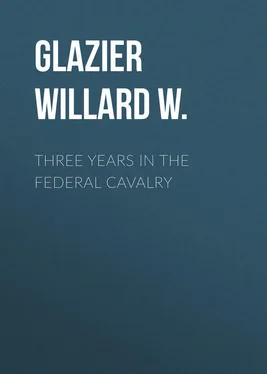Willard Glazier - Three Years in the Federal Cavalry
Здесь есть возможность читать онлайн «Willard Glazier - Three Years in the Federal Cavalry» — ознакомительный отрывок электронной книги совершенно бесплатно, а после прочтения отрывка купить полную версию. В некоторых случаях можно слушать аудио, скачать через торрент в формате fb2 и присутствует краткое содержание. Жанр: История, foreign_antique, foreign_prose, short_story, на английском языке. Описание произведения, (предисловие) а так же отзывы посетителей доступны на портале библиотеки ЛибКат.
- Название:Three Years in the Federal Cavalry
- Автор:
- Жанр:
- Год:неизвестен
- ISBN:нет данных
- Рейтинг книги:4 / 5. Голосов: 1
-
Избранное:Добавить в избранное
- Отзывы:
-
Ваша оценка:
- 80
- 1
- 2
- 3
- 4
- 5
Three Years in the Federal Cavalry: краткое содержание, описание и аннотация
Предлагаем к чтению аннотацию, описание, краткое содержание или предисловие (зависит от того, что написал сам автор книги «Three Years in the Federal Cavalry»). Если вы не нашли необходимую информацию о книге — напишите в комментариях, мы постараемся отыскать её.
Three Years in the Federal Cavalry — читать онлайн ознакомительный отрывок
Ниже представлен текст книги, разбитый по страницам. Система сохранения места последней прочитанной страницы, позволяет с удобством читать онлайн бесплатно книгу «Three Years in the Federal Cavalry», без необходимости каждый раз заново искать на чём Вы остановились. Поставьте закладку, и сможете в любой момент перейти на страницу, на которой закончили чтение.
Интервал:
Закладка:
August 13. – To-day Captain Buel's company of Trojans was summoned together for the purpose of leaving for the South. Under a severe, drenching rain we were drawn up in line fronting the residence of General John E. Wool, when the old veteran delivered a most heroic address, which led us quite to forget the pelting rain, and prepared us for our departure. The boys then found a very pleasant shelter on board the Vanderbilt, bound for New York City. The day following all the New York State men rendezvoused at 648 Broadway, and were mustered into the service of the United States by Lieutenant-colonel D. B. Sackett, of the regular army. At four o'clock P. M. we were ordered aboard a train of cars, and told that our destination was Camp Howe, near Scarsdale, twenty-four miles north of the city, between the Harlem and East rivers. We reached the place just in time to pitch our tents for the night – an operation which was not only new and strange, but performed in any thing but a workman-like manner. We had every thing to learn, and this was our first lesson in soldiering.
Captain A. N. Duffié, of Co. A, a Frenchman and graduate of the military school of St. Cyr, France, is in command of the camp, and is to be the superintendent of our discipline and drill. He is undoubtedly well qualified for this position.
August 16. – This morning we commenced the inevitable drill on foot, as we are still without horses. We find this exercise very severe, and yet, in view of its great importance, we accept it with a good degree of relish. Our drill-master is thorough and rigidly strict, after the fashion of the French schools. We cannot avoid learning under his tuition. In the afternoon we were set to policing camp. This comprises the cleaning of one of the roughest farms in the country of stone. And as a remuneration to the owners for the use of this most unsightly of God's forsaken ground, we are compelled to build stone fences – a very unpleasant introduction to military life, and an occupation which by no means accords with our ideas of a soldier's duties. But our hands toil with a protest in our hearts, and with a certain resolve that this kind of fencing must not long continue.
After a week spent in drill and the stone-wall enterprise, we were all surprised one morning with an order to fall into line to receive a Napoleonic harangue from Captain Duffié. So many and even loud had been our protests, and so glaringly manifest our rebellious spirit on the subject of fortifying a farm in the State of New York, that the captain undoubtedly feared that he might not be very zealously supported by us in his future movements, and so, like Napoleon, on assuming command of the army of Italy, he sought to test the devotion of his men. After amusing us awhile in his broken English, and arousing us by his touching appeals to our patriotism and honor, at length he shouted, "Now as many of you as are ready to follow me to the cannon's month, take one step to the front." This dernier resort to pride was perfectly successful, and the whole line took the desired step. We were then ordered to be ready to leave camp at eleven o'clock that morning, which was on the twentieth of August, assured that Washington, D. C., was our destination.
Our ranks were quickly broken, and all due preparation made for our departure. After marching to Scarsdale we took cars and were soon landed in the metropolis, through the principal streets of which our command passed to the Jersey City ferry. Without much delay we reached Philadelphia in the evening, where we were bountifully supplied with rations by her proverbially generous and patriotic people. True to the instinct of "Brotherly Love," the citizens are making arrangements such as would indicate that millions of Union soldiers might be fed at their tables. Here we spent the night. The next morning at 6.30 we were on our way southward. A brief halt was made in Baltimore, whose streets still seem to be speaking of the blood of the brave Massachusetts men. And as we march along, we can but recall the poet's prophesy:
"And the Eagle, never dying, still is trying, still is trying,
With its wings upon the map to hide a city with its gore;
But the name is there forever, and it shall be hidden never,
While the awful brand of murder points the Avenger to its shore;
While the blood of peaceful brothers God's dread vengeance doth implore,
Thou art doomed, O Baltimore!"
At 4 o'clock P. M. we beheld the dome of the nation's capitol, and, after landing, we were marched to the eastern part of the city, and pitched tents near Camp Oregon – named thus in honor of Colonel Edward D. Baker, who represented that Territory in the Senate of the United States, previous to his acceptance of a military commission, and who is now in command of the famous California regiment which occupies this camp.
CHAPTER II.
CAMP-LIFE AND ITS INFLUENCES
1861. – Our unmilitary Appearance. – First Equipage. – My Black Mare. – Good and Evil Influences. – News-Boys. – Mail-Bag. – Letter-Writing. – The Bugle Corps. – Camp Guard. – Guerillas under Turner Ashby. – Mounted Drill. – Laughable Experiences with Horses. – Southern Egotism. – Northern Fancies.
Drill! drill! and camp-police are the order of the day. Indeed we have nothing else to do, and to do nothing at all is the hardest kind of work. We expect soon to have some accoutrements to enable us to drill something besides our feet. Our preparations for war have commenced at the extremities; for thus far nothing but our heads and feet have been instructed. However, as we become better acquainted with this part of our duty we enjoy it better than at first, and we think we are making no very mean progress.
For some time after our arrival here, the Government was unable to supply us with uniforms, or weapons of war, and our appearance was far from being à la militaire , as Captain Duffié would have it. Coming as we did from colleges and schools, from offices and counting-rooms, from shops and farms, and some from no occupation at all, each with the peculiar dress he wore when he enlisted, and already pretty well worn out by our labors at Camp Howe and extensive travelling, we were a most unsightly, heterogeneous mass of humanity, and were a subject of no little sport to our better-clad fellow-soldiers. Especially was this the case when on a certain day General B. F. Butler reviewed the troops of this department, and we were made to appear before him and the multitude with our hats and caps, our coats and jackets, in nearly all colors, and many of them in rags and shags. We certainly had nothing to recommend us to the consideration of military men, except the courageous spirit that throbbed in our generally robust frames. But we were hopeful of better days, when we might have the appearance and equipage as well as the internal qualities of soldiers.
But the Government was so wholly unprepared for war, that our supplies were received very slowly. First came our uniforms, which every man donned gladly, and yet with a feeling that the last link to civil life, for the present, was severed, and that henceforth in a very peculiar sense we belonged to our common country.
A few days after our arrival at Camp Oregon, we were joined by the men who belonged to our regiment from other States. This added fresh enthusiasm, as well as new strength, to our ranks. However, there is as yet nothing in our tout ensemble to distinguish us from infantry or artillery, except the yellow trimming of our blue uniforms, whereas the infantry has the light-blue trimming, and the artillery bright red.
August 23. – To-day I am happy to make the following entry in my diary, namely: the regiment was furnished with sabres, Colt's revolvers and all the necessary appendages, consisting of belts and ammunition-boxes. Every man has now a new care and pride – to keep his sabre bright, and his entire outfit clean, that he may wear them with pleasure to himself and honor to his comrades. The morning and evening of the 24th were spent in sabre exercise, with which we were all delighted. This is the first development in us of the cavalry element as such, and we begin to feel our individuality. We desire to have this growth continue uninterruptedly, and in aid of it, in the early part of September, came quite a large installment of horses and equipments. This occurred while the regiment occupied a camp about three miles from Washington, on the Bladensburg road, which we named Sussex, in honor of Sussex county, New York, our colonel's native county. As the number of horses furnished us at this time was not sufficient to mount the whole command, the number received by each company was proportioned to the maximum roll of its men. After the non-commissioned officers of each company, including all the sergeants and corporals, had drawn their horses according to rank, the privates were made to draw lots for the remainder – a performance which produced no little amount of excitement.
Читать дальшеИнтервал:
Закладка:
Похожие книги на «Three Years in the Federal Cavalry»
Представляем Вашему вниманию похожие книги на «Three Years in the Federal Cavalry» списком для выбора. Мы отобрали схожую по названию и смыслу литературу в надежде предоставить читателям больше вариантов отыскать новые, интересные, ещё непрочитанные произведения.
Обсуждение, отзывы о книге «Three Years in the Federal Cavalry» и просто собственные мнения читателей. Оставьте ваши комментарии, напишите, что Вы думаете о произведении, его смысле или главных героях. Укажите что конкретно понравилось, а что нет, и почему Вы так считаете.












